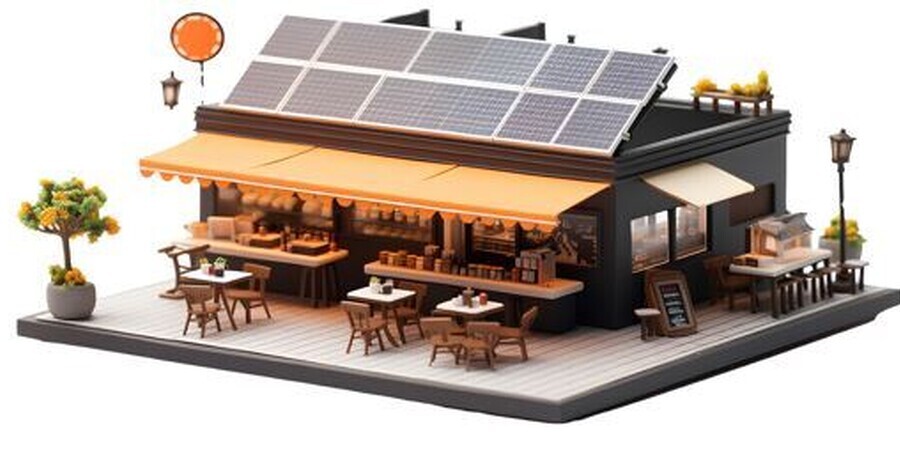Philadelphia, PA - In the evolving landscape of the food industry, business owners are continuously exploring innovative ways to optimize their operations and reduce their environmental impact. Among the various sustainable solutions, adopting renewable energy sources stands out as a pivotal strategy. Solar power has garnered significant attention for its potential to offer a clean, sustainable, and cost-effective energy alternative.
This exploration delves into the advantages and disadvantages of integrating solar generators into food business operations, providing a comprehensive overview for proprietors considering this green energy transition.
Advantages Of Solar Generators For Food Businesses
Below are the benefits of using solar generators for food businesses:
- Reduction In Energy Costs
The adoption of solar generators by food businesses significantly reduces operational costs. Sunlight, an inexhaustible and free resource, is converted into electricity, eliminating the hefty bills associated with conventional energy sources. This is particularly beneficial for establishments with high power usage. Restaurants and cafes, for instance, extensively use refrigeration, cooking, and heating appliances for food preservation and safety. Over time, the investment in solar energy pays off, yielding significant financial savings that can be used for business growth and innovation.
- Energy Independence And Reliability
Solar generators offer food businesses a priceless commodity: energy autonomy. This is invaluable, especially in areas prone to power outages or during periods of high electricity rates. Solar energy systems are renowned for their durability and minimal maintenance requirements, providing a consistent and reliable power supply. This reliability ensures uninterrupted business operations, vital for maintaining customer satisfaction and operational efficiency.
- Incentives And Financial Support
The initial cost of solar energy systems, often seen as a barrier, is lessened by financial incentives from various sources. These incentives, including tax credits, grants, and rebates, are designed to encourage the adoption of renewable energy sources.
For food businesses, these financial aids can significantly lower the upfront investment in solar generators, hastening the return on investment. Such support makes solar energy more accessible and demonstrates the broader societal push towards sustainable energy solutions.
- Environmental Stewardship
Embracing solar generators signifies a food business's commitment to environmental responsibility. Unlike fossil fuels, solar energy generates power without emitting harmful pollutants, thereby reducing a business's ecological footprint. This commitment to sustainability aids in combating climate change and aligns with the values of environmentally aware consumers. Establishments prioritizing green practices are likely to attract a loyal customer base, enhancing their market position as environmentally conscious brands.
Disadvantages Of Solar Generators For Food Businesses
Despite these advantages, there are drawbacks to using solar generators in food businesses. These may include:
- Initial Investment And Space Requirements
The transition to solar energy often entails a substantial initial outlay for food businesses. This investment includes solar panels, essential components like batteries and inverters, and professional installation costs. Beyond finances, solar panel installation requires significant space. This can challenge businesses in confined urban areas or those with restrictive leases. These factors require careful planning and assessment of both financial and spatial resources before committing to solar power.
- Weather Dependency And Storage Limitations
The efficacy of solar generators is closely tied to climatic conditions, as solar panels require direct sunlight to operate at peak efficiency. This reliance on weather can introduce inconsistencies in energy production, particularly in regions prone to prolonged overcast or rainy seasons.
To mitigate these inconsistencies, businesses must invest in advanced battery storage solutions. However, these storage systems increase costs and complexity, necessitating careful consideration of local climate and energy needs.
- Aesthetic Considerations
The visual impact of installing solar panels concerns some food businesses, especially in areas with strict aesthetic or historical standards. While the appearance of solar panels can symbolize a commitment to sustainability, it may not align with every business's branding or the architectural harmony of certain locales. Aesthetic concerns require businesses to balance the visual impact of solar panels with their benefits, possibly exploring less obtrusive options or seeking community input.
- Complexity And Need For Expertise
Implementing solar power isn't just about buying equipment; it involves understanding complex technical specifications, building codes, and permit requirements. For many food businesses, especially smaller operations, this complexity can be daunting. It necessitates partnerships with skilled professionals who can guide the process from initial assessment to installation and ongoing maintenance.
This expertise ensures compliance with local regulations and the optimization of the solar system for maximum efficiency and longevity, which underscores the importance of thorough planning and professional guidance in the transition to solar energy.
Conclusion
Integrating solar generators into food business operations presents a blend of opportunities and challenges. With the information mentioned above in mind, food business owners must carefully consider the pros and cons pertaining to their specific operational needs and goals. By making informed decisions, they can harness the power of solar energy effectively, contributing to a more sustainable and resilient food industry.


